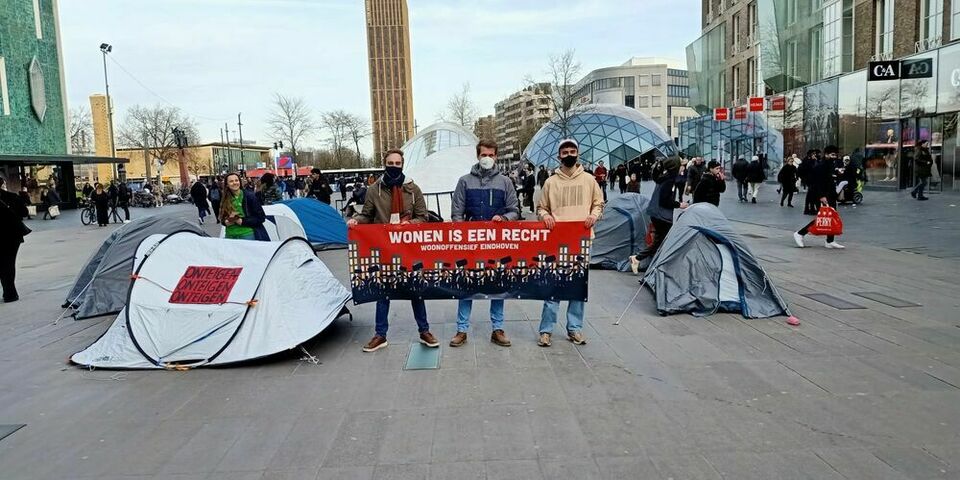Municipal council discusses motion on student housing shortage
Political parties GroenLinks, Volt and PvdA have drafted a motion on student housing, which was discussed during a municipal council meeting on Tuesday, December 20. The motion was embraced by responsible alderwoman Mieke Verhees. “I embrace this motion as a show of support for the issues we’re working on already.” The alderwoman promises to dedicate herself to this cause. The council makes special mention of TU/e’s responsibility in this matter, as a result of the university’s recently announced growth plans.
Rutger Rauws of GroenLinks put his motion ‘Student residence wanted’ (only in Dutch) – which also happened to be his maiden speech – yesterday on the table. He started off with a personal story about how he too has been unexpectedly impacted by the housing crisis. “I’ve heard many stories about students living in tents, roaming from sofa to sofa, or staying in far too expensive Airbnbs. I myself have been homeless for three weeks now as well. Ever since my relationship came to an end, I’ve been sleeping on a friend’s floor. My colleagues are kind enough to offer me their sofas, but I’d prefer to return to a place that really feels like home after a long day at work. A place of my own where I can be by myself or invite friends over. I’m lucky because I have a network here. Students who are new to this town have no such network and are much worse off than I am. It’s important that this group finds its way onto the municipality’s radar,” he says.
The authors of the motion propose to make adjustments to the student housing covenant that was signed in April 2021, and to re-assess it with new information about TU/e’s growth plans. If not, the problem of housing shortage will simply continue to exist. After all, without any adjustment to the covenant, a sudden, significant growth of TU/e will only exacerbate instead of alleviate the housing shortage crisis. Initially, the demand for new accommodations was expected to climb to 2840 homes by the year 2028. The signatories of the covenant agreed to build those homes. However, in view of TU/e’s change of course, the so-called scale jump, and the strong increase in student numbers by several thousands, that forecast will need to be adjusted, in order to prevent the housing shortage from increasing even further.
Alderwoman for Housing Mieke Verhees responded to the motion as follows: “I see this motion as a show of support for the concerns we all share when it comes to student housing. This group has our special attention, as is evident from the student housing covenant that was drafted and the regular meetings on this issue on an administrative level. But it’s true that something has changed in the meantime: TU/e announced its ambitious growth plans. We are currently discussing this issue.”
Verhees will re-assess the covenant: “We went and visited TU/e with the entire council (municipal council, ed.), and a project group was set up to jointly work on this issue. We plan to re-assess the covenant with the new information, meaning the intended growth. It was never the aim to perpetuate a housing shortage. Apart from TU/e, we’re also talking to industry. However, we can’t forbid TU/e to grow, since the university is an independent institution.”
SP council member Murat Memis asked the following question pertaining to that latter statement: “Can’t the Eindhoven municipality impose a maximum (number of students. ed.) on TU/e? So that there’s a balance between the number of students and housing?” The alderwoman responded by saying that “it’s still too early to make any kind of statement about that. TU/e announced its growth ambitions as recently as last fall. A team is currently working on it, but I can’t imagine us (the municipally, ed.) imposing figures.”
Responsibility of TU/e
Rauws had to answer several questions from various parties. Most of these questions were about TU/e’s responsibility in the matter of housing shortage, and about how the university can contribute to a solution. Tom Meylink of the VVD: “It’s striking that, unlike many other universities, TU/e wants to grow and attract more internationals. Shouldn’t the university bear some responsibility for that?” The SP puts it more firmly: “You need to look at it differently. In view of the housing shortage, the university should take into account the remaining opportunities for growth, instead of saying ‘we intend to grow by that specific number of students,’ without thinking first about where these students are supposed to live. Cut your coat according to your cloth.”
However, some council members said that much is being done already to tackle the issue of housing shortage, and some wondered what this motion has to add. Rauws: “Yes, students have their own covenant, but it appears that we want to maintain the shortage of houses for this group (referring the TU/e’s new growth plans), and that’s why this issue requires renewed attention.”
Next steps
Afterwards, Rauws says that he is “very happy that alderman Verhees responds positively to our motion. It shows that the board of mayor and aldermen endorses the position of GroenLinks and will make every effort - as with other target groups - to reduce the housing shortage. GroenLinks is critical of TU/e's ambition to double the number of students in order to prepare enough employees for ASML. With this motion, the board of mayor and aldermen endorses that they will make agreements with the OEMs and educational institutions to balance growth ambitions with the number of available student homes.”
The parties behind the motion have also planned follow-up steps. Rauws: “We plan to meet with as many student associations as possible in January. We want to collect their input. These can be experiences but also ideas. We will then take this input back to the city council to discuss it further with other parties.”
Header: Housing Protest earlier this year on 18 Septemberplein in Eindhoven.



Discussion